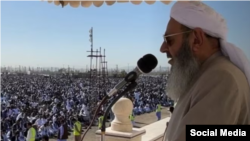A Sunni imam said Friday during an Eid al-Fitr sermon in Zahedan, Iran, that people have a right to protest and the government should listen to their demands.
In an audio file published on his Telegram channel, Molavi Abdul Hamid was quoted as saying the people's desire is "the release of political prisoners" and the government should consider the wishes of most of the Iranian nation.
Referring to the deadly suppression of protesters last September, he said: "The people of Zahedan want justice and punishment for the perpetrators and those who ordered people shooting. … We will not ignore the people's rights."
On September 30, after the Sunni Friday prayer in Zahedan city, a fierce clash broke out between military forces and protesters. About 100 people were killed and about 300 injured, according to media reports. At the time, state media said Sunnis gathered after Friday prayers to throw stones and attack the No. 16 Zahedan police station, causing conflict with security forces.
In his Eid al- Fitr sermon, Hamid addressed the economic hardships of Iranians.
"Everyone is in debt and under lots of pressure," he said, adding that authorities should pay attention to the widespread dissatisfaction.
“Our compassionate advice is to get along with people,” he said. “They should give in to the rightful demands of the Iranian people. As long as the people do not cooperate and are dissatisfied, problems will only increase in the country."
He also said that “silence of people does not mean that the nation is satisfied," urging the government to address the issue. "We should sit and talk with the people ... and problems and issues should be solved in any way that these people are satisfied with."
In the end, Hamid emphasized the need to make significant changes in the country and said the people's satisfaction would not be achieved with minor modifications.
"Improving relations with neighbors is good, but it cannot solve the country's problems, and we must have good relations with the whole world,” he said. “The people's problems will not be solved until significant changes occur within the country."
Last fall, Hamid had asked the Qom seminary — Iran's largest — along with the country's authorities to listen to the voices of protesters, ultimately calling on rulers to respond to their demands via a series of public referenda.
While officials in Tehran did not respond at that time, Supreme Leader Ayatollah Ali Khamenei this week rejected renewed calls by former President Hassan Rouhani for public referenda on domestic and foreign policies.
Khamenei said he was against the idea because "not all people have the power to analyze the issue which is put to the referendum."
Under Iran's constitution, a referendum is possible only if two-thirds of parliament votes for it and a 12-member constitutional body approves.





